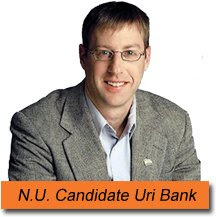
This past Saturday night, 1,700 English-speaking Israelis packed into Jerusalem’s Great Synagogue to hear candidates from nine different Knesset factions speak of their respective parties' platforms. Many of the speakers addressed the need for significant changes in the way the country deals with national and security issues. Ichud Leumi candidate Uri Bank, the only native English-speaker on the panel, was greeted with rounding applause in response to his call to ensure that the Land of Israel remains in Jewish hands.
Western Aliyah has been the focus of recent Knesset caucuses and initiatives and is largely seen as the next source of potential mass Aliyah, especially in light of the current economic climate and a dramatic decrease in immigration from the former Soviet Union. Last year, 2008, saw the numbers of new Olim from all countries drop to the lowest Aliyah figures since1988. Despite the Herculean efforts of organizations like Nefesh B'Nefesh and Ami, the number of Olim from western countries remained the same as the previous year.
Immigrants, Not Immigration
Bank, who made Aliyah with his family from the U.S. at the age of 12, explained to Israel National News the flaw of all the new initiatives that seem to appear around elections time and then fade away as the new Knesset session begins. "A new caucus and lobby for western Aliyah is doomed to fail, like many previous efforts,
 because it is pushing Aliyah at the expense of Olim," he said.
because it is pushing Aliyah at the expense of Olim," he said.He explained that until the experience of Aliyah is radically altered to become a comfortable, exciting experience, the numbers of western Olim will not increase: "The system must take into account that making Aliyah can be a difficult choice for many Jews from western countries, involving leaving their homes and comfortable lifestyles, bureacracy, difficulties in having degrees recognized and attaining professional licenses, and more."
When you came, they unrolled a red carpet,” reads the Ichud Leumi flyer distributed at the January 31 political debate, “but then they replaced it with red tape.” Uri Bank says his goal is to be the scissors to cut through that tape and bring a new life to Olim, while strengthening the country in the process.
Uri Bank is no stranger to the issues faced by Jews who make Aliyah from western countries. As a 12-year-old Oleh, Uri had to adjust to an Israeli classroom. When his family returned to the
He actively entered the Knesset election campaign only recently, after having served the IDF as a reserve soldier during Operation Cast Lead. Bank completed his term of reserve duty even though he was legally exempt as a Knesset candidate and knew it would diminish his ability to campaign. He is spending the remaining week before the elections promoting the idea that the time for change has come, and that his background as an Oleh from the United States will enable him to effect that change.
"It is not that the government doesn't care," Bank explains, "but they don't know how to appeal to Jews from affluent, western countries. The government treats them based upon a system which wasn't built for Olim who come to
Bank insists that these Olim have to be treated by a system that understands them, or they may never come in the droves that the Zionist endeavor needs. Furthermore, those who leave after having endured frustrations with
“No one should have to go through the hardships my family went through when they originally made Aliyah," he said, "fighting a system which doesn't understand them, and which ultimately caused them to leave
"A culture of accountability is the next best thing to district electoral reform, but it needs to begin with someone who has experienced a system of checks and balances and knows its merits and how it works." Uri also intends to put together an English-speaking Knesset team with a clear focus on tax reform, licensing, and educational issues that many Olim and their children currently face. He says his office will have an open-door policy for all issues confronting Olim from western countries.
Instead of pursuing membership on what are viewed as the more prestigious committees, Bank says he intends to sit on the Aliyah and Absorption Committee and even assume its chairmanship if offered. "Everyone wants western Aliyah," he notes, "but we are going to show them how to treat western Olim, and the Aliyah will soon come."
The Ichud Leumi's new Aliyah plan targets tax reform, erasing former Finance Minister Binyamin Netanyahu's taxation plan of
The Oleh Forum, as Bank sees it, will comprise elected representatives of Olim from various countries, with representatives from every country over various periods of Aliyah. The forum will meet to address immigrant needs and be the partners in effecting change in government policy and
Polls Show
Recent polls have shown the Ichud Leumi with five Knesset seats, which would guarantee Bank's election. However, he states, "we are aiming for at least ten seats, and the Aliyah vote will help to make it happen. The bigger the party is, the more we can represent our constituents which include western Olim and all those who want to make the State of Israel the dream Jewish state it is supposed to be."



.jpg)
No comments:
Post a Comment